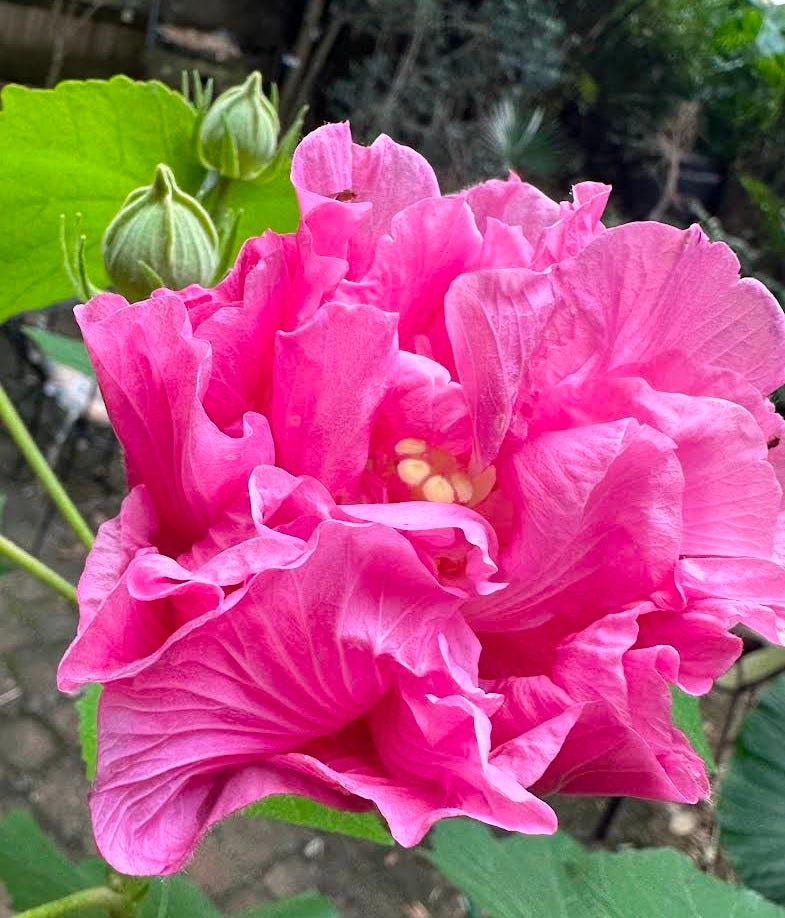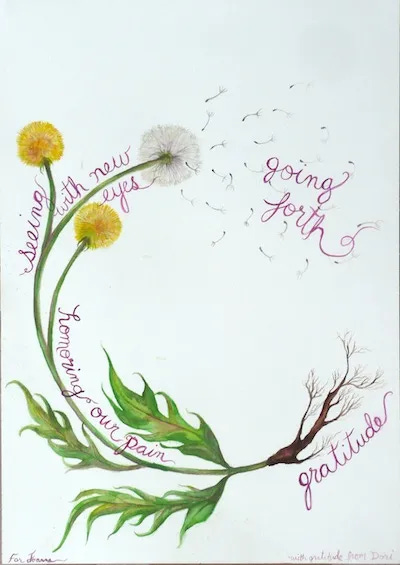How I Changed My Sh*tty Attitude About Gratitude
And Happy Thanksgiving to those who celebrate
Hello friends.
This week, for Thanksgiving, I’m presenting a post about gratitude that first ran back in May. A few thousand more of you have joined the newsletter since then—thank you!
I had a wonderful, wide-ranging conversation with Thomas Doherty and Panu Pikhala on the podcast Climate Change and Happiness—please check it out.

I also have an update. Just last month, in October, my dad invited me into his daily gratitude practice. Every day, we text each other three things we’re grateful for. He does this with others as well.
My father, if you don’t know him, is a poet, a dream worker, and the author of several books.
The texts are accreting, forming a little record of our lives, which, of course, are made up of our days. My dad texts about playing trucks with his grandson, about his dog Kenny and his many friends and neighbors and dream clients, and my mom, and the birds and flowers around New Orleans.
“The shadows of crows flying against bright green leaves.”
“The cry of the grey catbird in the swamp magnolia a sound like complaint or despair.”
I text about my kids and husband, my friends, delicious meals, felicitous conversations from work, the quality of light or the leaves or birds that I notice on my morning run, and music and dancing. And sometimes about you!
“Dinner is gnocchi and roasted beets and sliced yellow tomatoes with olive oil and salt”
“Morning dance party in the kitchen to Jefferson Airplane”
“I get a message from my friend Justin about my new newsletter. He says I made him cry before 7 am.”
November has been a low month in many ways. Work has had some ups and downs, there was the drought and the fires, the election results were devastating
But there wasn’t a single day that I couldn’t find three little things that made me feel good. Often these are kindnesses extended as well as received.
Over time what’s emerged is a record of small, enduring and renewed joys. I’ve noticed it developing my muscle of noticing happy things.
So, as cringe or unnatural as it may sound, I’m going to recommend this form of gratitude journal-keeping—doing it with a friend, or anyone you’d like to keep in better touch with. I have a friend who names gratitudes at bedtime with her kid, which I think is a beautiful idea.
Let me know how you get on in the comments below, as my favorite Youtube Pilates personality always says. Now, on to the original post.
I have a confession.
I used to suck at gratitude and hate it. Just the mention of the concept brought out my inner brat! Gratitude journals, gratitude lists, yuck. It always felt so forced, empty and obligatory. It felt like a parental expectation that I could never adequately fulfill, that I feel a certain way at a certain moment, and so I would end up feeling bad about myself on top of feeling disappointed in some obscure way.
Growing up, I remember many failures of gratitude. Once, for Hanukkah, I asked for a set of bed linens I saw in a catalogue that was printed with a photograph of a multicolored landscape and sunset. I thought they were gorgeous.
My parents tried. The sheets they actually bought were printed with a pretty pattern that resembled a twilight sky, but were not photographically detailed and were not at all the precise sheets I coveted. I don’t think I threw a tantrum, exactly, but I was disappointed, and they were disappointed that I was disappointed.
I had those sheets for years. They had a high polyester content and turned scratchy and pilly.
I brought this cycle of expectation and disappointment to my marriage. It took us years to work out how to lower the stakes on gift-giving occasions.
As a mom, however, I think my allergy to gratitude actually served me well, in that I didn’t at all or in any way expect my kids to be grateful to me. This was a relief emotionally, because you do so many things for your kids, day in, day out, and there’s just no way they could ever authentically respond.
Although I definitely, ritually, and to no real end, succumb to the social pressure to prod them to say thank you and write thank-you notes. Research shows the better way to cultivate gratitude in your kids is to express your appreciation to them, for what they do, authentically and frequently.
When I discovered the work of Joanna Macy, I was always a little bit confounded by the fact that she starts her spiral journey on the pain for the world with gratitude. In my experience, it’s our broken hearts and the feelings we can no longer handle alone that bring us to this exploration in the first place. That always felt to me like step zero.
But before diving into the darkness, Macy’s exhortation is to resource and ground yourself by reminding yourself what you are grateful for. Including even, paradoxically, the pain itself that brought you there.
That is what the third episode of Joanna’s podcast with Jess Serrante that I produced, We Are The Great Turning, is all about.
In this episode, Joanna expresses a moment of deep hopelessness.
Jess asks her if they can connect to gratitude before they continue.
Joanna says:
That’s right—we don't begin like that, as you remind me.
We can begin at any moment to just feel that we're breathing and be glad we can breathe. That we have lungs, that we have air, that there's oxygen. And... And we're sitting here together to let the truth of what we know and feel be spoken.
Ahhh.
The gratitude I’ve always found it impossible to summon on cue, seems to be connected with my expectations of the world. And it’s in my nature, as a human being, to be dissatisfied. I’ve always taken a lot of comfort in the Buddhist idea of dukkha— dissatisfaction. Dukkha is both not getting what you want, and getting what you don’t want—like those scratchy sheets.
The kind of gratitude Joanna is summoning in this moment isn’t about any expectation. It’s more like noticing. Noticing the absolute careless abundance of the gift of life. You’re already enjoying it, and now you enjoy even more by calling attention to your own enjoyment. It’s “wanting” what you have already got.
Nature isn’t standing over you saying, “How do you like that sunset? Is it just the one you wanted? Does it fit? Are you happy? Hmmm?” Nature just gives.
This kind of everyday gratitude I find it a lot easier to express to, and even hear from, my partner. Thanks babe for folding the laundry! Thanks for making dinner! Thanks for cleaning up the kitchen! Thanks for holding down the fort while I go to yoga! Maybe because he’s not necessarily expecting thanks or doing it for thanks. What I feel in return is gratuitous gratitude—given freely, not as part of an implied transaction.
I worked with the Finnish climate emotions researcher Panu Pikhala on a new written guide to exploring our Climate Emotions Wheel, and here’s what we came up with as a definition for gratitude.
Gratitude is a living thing’s essential orientation toward the many pleasures of being alive.
When a cat stretches and closes its eyes to the sunbeam—this is a gesture of gratitude.




